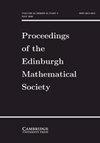Discriminant and integral basis of number fields defined by exponential Taylor polynomials
IF 0.9
3区 数学
Q2 MATHEMATICS
Proceedings of the Edinburgh Mathematical Society
Pub Date : 2024-04-08
DOI:10.1017/s0013091524000105
引用次数: 0
Abstract
Let指数泰勒多项式定义的数域的判别和积分基础
让 $K_n=\mathbb{Q}(\alpha_n)$ 是一个代数数域族,其中 $\alpha_n\in \mathbb{C}$ 是第 n 次指数泰勒多项式 $\frac{x^n}{n!}+ (frac{x^{n-1}}{(n-1)!}+ (cdots +\frac{x^2}{2!}+\frac{x}{1!}+1$ , $n\in \mathbb{N}$。在本文中,我们用 n 的 p-adic 扩展给出了除以 Kn 的判别式的任何素数 p 的精确幂的公式。这些 p 积分基很快就能导致 Kn 积分基的构建。
本文章由计算机程序翻译,如有差异,请以英文原文为准。
求助全文
约1分钟内获得全文
求助全文
来源期刊
CiteScore
1.10
自引率
0.00%
发文量
49
审稿时长
6 months
期刊介绍:
The Edinburgh Mathematical Society was founded in 1883 and over the years, has evolved into the principal society for the promotion of mathematics research in Scotland. The Society has published its Proceedings since 1884. This journal contains research papers on topics in a broad range of pure and applied mathematics, together with a number of topical book reviews.

 求助内容:
求助内容: 应助结果提醒方式:
应助结果提醒方式:


